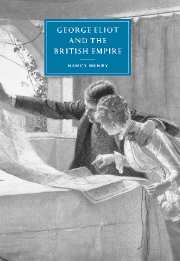Book contents
- Frontmatter
- Contents
- List of illustrations
- Acknowledgments
- List of abbreviations and note on the texts
- Introduction
- 1 Imperial knowledge: George Eliot, G. H. Lewes, and the literature of empire
- 2 “Colleagues in failure”: emigration and the Lewes boys
- 3 Investing in empire
- 4 Daniel Deronda, Impressions of Theophrastus Such, and the emergence of imperialism
- Conclusion
- Notes
- Bibliography
- Index
- CAMBRIDGE STUDIES IN NINETEENTH-CENTURY LITERATURE AND CULTURE
1 - Imperial knowledge: George Eliot, G. H. Lewes, and the literature of empire
Published online by Cambridge University Press: 22 September 2009
- Frontmatter
- Contents
- List of illustrations
- Acknowledgments
- List of abbreviations and note on the texts
- Introduction
- 1 Imperial knowledge: George Eliot, G. H. Lewes, and the literature of empire
- 2 “Colleagues in failure”: emigration and the Lewes boys
- 3 Investing in empire
- 4 Daniel Deronda, Impressions of Theophrastus Such, and the emergence of imperialism
- Conclusion
- Notes
- Bibliography
- Index
- CAMBRIDGE STUDIES IN NINETEENTH-CENTURY LITERATURE AND CULTURE
Summary
… and yet, how little do we still know of Africa.
George EliotLike many of her contemporaries, George Eliot looked to the empire for solutions to poverty and unemployment in England. In January 1851, she moved from Coventry to London, and between 1851 and 1854 she edited the Westminster Review for its publisher, John Chapman. On December 20, 1851, her brother-in-law Edward Clarke died, leaving her sister Chrissey with six children and a considerable debt. Although Eliot had emigrated to London rather than to a colony to escape the “moral asphyxia” of the Midlands, she thought Australia was just the place for her widowed sister and six orphaned children. Chapman had traveled to Australia before becoming a publisher and he was at the time engaged in preparing Sophia Tilley, the sister of his mistress, Elisabeth Tilley, to emigrate to Australia (GEL, 2:93). Writing to her friends Charles and Cara Bray in Coventry, Eliot asked: “What do you think of my going to Australia with Chrissey and all her family?” According to this plan, Chrissey was to relocate permanently because she seemed to have so few alternatives in England; it may have been the one way to keep the family together. Eliot did not intend to stay, merely “to settle them and then come back” (GEL, 2:97). Chrissey's emigration would give her a chance to travel, see the world, and return home, perhaps to write for an English audience about what she had seen in Australia.
- Type
- Chapter
- Information
- George Eliot and the British Empire , pp. 15 - 41Publisher: Cambridge University PressPrint publication year: 2002



